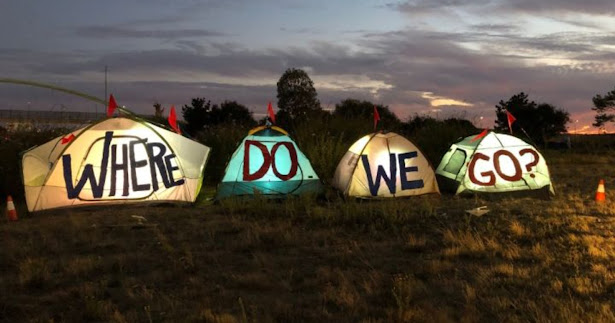How Climate Change Affects the Health of Houseless Individuals
As the houseless crisis seems to worsen in developing countries, and as climate change continues to alter our planet, people who live exposed to the elements are subject to new and worsening impacts. Four major environmental changes are going to put vulnerable houseless individuals at higher health risks include increased heat waves, increased air pollution, increased severity of floods and storms, and the changing distribution of the West Nile Virus.
Millions of people experience homelessness around the world, whether that be complete lack of housing or by using shelters. Chronic diseases are often more prominent within these communities, often times because of the lack of health care available. Substance abuse, cognitive impairment, mental health issues, and extreme poverty exacerbate this. Illnesses such as cancer, heart disease and cerebrovascular diseases are major causes of death within homeless communities. Chronic lung conditions such as asthma, bronchitis and emphysema can go untreated for long periods of time, often leading to even worse conditions. Additionally, as these people are either always, or very often exposed to the elements, vulnerability of mortality from heat or cold exposure is increased. These compounding factors put homeless people at a higher risk of health concerns with the changing climate of our planet.
The most obvious risk from climate change/global warming, is the increasingly severe heat waves we experience. Already in the United States, we are seeing heat waves with temperatures around 120 degrees F on a yearly basis. Such heat waves put vulnerable houseless people in a very bad situation. In a 2003 record breaking heatwave in Europe, 35,000 people were estimated to have died due to it. Factors that put people at risk of death during a heatwave include cardiovascular diseases, pulmonary disease, advanced age, living alone, being socially isolated, not using air conditions, alcoholism, using tranquilizers, and cognitive impairment, many of which are more often effecting homeless people. This is only the beginning, and heatwaves will continue to put homeless people at risk.
Air pollution will also cause increasing health concerns for homeless individuals. Its estimated that 800,000 people die every year because of air pollution related illnesses. Increased ozone concentrations, harmful aerosols from industry, or other harmful chemicals effect our ability to breathe, and can cause long term illnesses if exposure is too common. Homeless people are obviously at a higher risk of intaking air pollution both due to increased exposure and disproportionately increased lung related conditions. They will be of the first to be negatively affected by its increasing prescence.
Increased severity of floods and storms will also put houseless people at a higher risk. These communities occupy marginal areas that are more vulnerable to such weather concerns. One of the biggest concerns with this is Hurricanes. Around 70 million people in the United states are susceptible to hurricanes, which can bring on intense flooding. Urban homeless communities are almost never considered in disaster planning for such storms.
The last and probably less considered impact of climate change that will disproportionally affect homeless people is West Nile Virus. The virus itself has been present in the US since 1999, and as the seasons shift into earlier onset spring, the breeding intensity of mosquitoes will also change. Since mosquitoes are most active at night this puts individuals who sleep outdoors at a much higher risk of infection. Such people often have compromised immune systems and therefore are at an increase susceptibility of developing meningoencephalitis if they become infected with WNV.
Overall, since homeless individuals have higher rates of illnesses, combined with either completely lacking or at least poor protection from the elements, the beforementioned climate change impacts will certainly affect homeless people disproportionately. This subject, however, is very understudied, and should not be ignored by researchers, city planners, politicians and people of power. Climate change is not going anywhere, and these people should not face the brunt of it.
Click this link to learn more and help!
Written by Seth Wright
Citations:
Ramin, B., & Svoboda, T. (2009). Health of the homeless and climate change. Journal of Urban Health, 86, 654-664. Stmadmin. (2021, September 18). Climate change and homelessness have this in common - A systems thinking perspective. Systems Thinking Marin. Retrieved February 23, 2023, from https://www.systemsthinkingmarin.org/2021/08/24/climate-change-and-homelessness-have-this-in-common-a-systems-thinking-perspective/ | |



Comments
Post a Comment